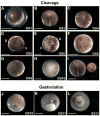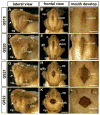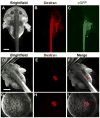Budgett's frog (Lepidobatrachus laevis): A new amphibian embryo for developmental biology
- PMID: 26169245
- PMCID: PMC4670266
- DOI: 10.1016/j.ydbio.2015.06.007
Budgett's frog (Lepidobatrachus laevis): A new amphibian embryo for developmental biology
Abstract
The large size and rapid development of amphibian embryos has facilitated ground-breaking discoveries in developmental biology. Here, we describe the embryogenesis of the Budgett's frog (Lepidobatrachus laevis), an unusual species with eggs that are over twice the diameter of laboratory Xenopus, and embryos that can tolerate higher temperatures to develop into a tadpole four times more rapidly. In addition to detailing their early development, we demonstrate that, like Xenopus, these embryos are amenable to explant culture assays and can express exogenous transcripts in a tissue-specific manner. Moreover, the steep developmental trajectory and large scale of Lepidobatrachus make it exceptionally well-suited for morphogenesis research. For example, the developing organs of the Budgett's frog are massive compared to those of most model species, and are composed of larger individual cells, thereby affording increased subcellular resolution of early vertebrate organogenesis. Furthermore, we found that complete limb regeneration, which typically requires months to achieve in most vertebrate models, occurs in a matter of days in the Budgett's tadpole, which substantially accelerates the pace of experimentation. Thus, the unusual combination of the greater size and speed of the Budgett's frog model provides inimitable advantages for developmental studies-and a novel inroad to address the mechanisms of spatiotemporal scaling during evolution.
Keywords: Amphibian; Embryo; Lepidobatrachus; Scaling; Stages; Xenopus.
Copyright © 2015 Elsevier Inc. All rights reserved.
Figures









References
-
- Amaya E, Musci TJ, Kirschner MW. Expression of a dominant negative mutant of the FGF receptor disrupts mesoderm formation in Xenopus embryos. Cell. 1991;66:257–270. - PubMed
-
- AmphibiaWeb. Information on amphibian biology and conservation. Berkeley, California: AmphibiaWeb; Dec 15, 2014.
-
- Beck CW. Studying regeneration in Xenopus. Methods Mol Biol. 2012;917:525–39. - PubMed
Publication types
MeSH terms
Grants and funding
LinkOut - more resources
Full Text Sources
Other Literature Sources

